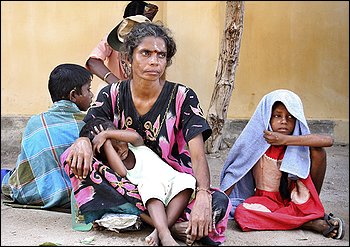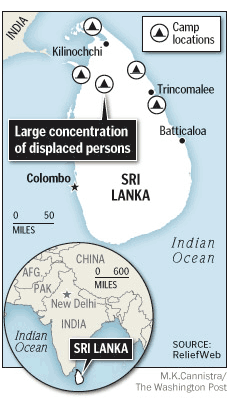Ilankai Tamil Sangam28th Year on the Web Association of Tamils of Sri Lanka in the USA |
|||||
 Home Home Archives Archives |
In Sri Lanka, Anger over Detainees' FateMany languishing in camps months after war's endby Emily Wax, The Washington Post, November 11, 2009
TRINCOMALEE, SRI LANKA -- Six months after Sri Lanka's decades-old civil war ended with a final assault, about 200,000 people remain trapped in overcrowded government-run camps that were once safe havens for those fleeing the conflict.
Facing pressure from the Obama administration and the European Union, the Sri Lankan government last month launched a campaign to resettle tens of thousands of the minority Tamil detainees. But interviews in the country's war-ravaged north reveal that many civilians have merely been shuffled from the large camps to smaller transit ones and are being held against their will. Others have been released, only to be taken from their homes days later with no indication of where they have gone. After the army defeated the Tamil rebels in May, top government officials paraded their success on the streets of Colombo, the capital, and the country's leaders made noble promises about ensuring national harmony. Now analysts say the real test of Sri Lanka's success in building a stable, post-conflict society lies in the fate of these scores of thousands of detainees.
"We thought this war was over. But for Tamils, it's like going from the frying pan and into the fire," said Devander Kumar, whose brother was released, only to be taken away by police without explanation, one of 30 men in this seaside city who have disappeared soon after their homecoming. "Do we Tamils have to prove every second of the day that we are not terrorists?" Tamil leaders worry that if civilians end up languishing in the camps indefinitely, the situation will only breed more resentments and risk spawning another generation of rebels. But the government says it needs more time to de-mine vast stretches of land in the north, as well as to repair infrastructure damaged by war. Authorities also say they continue to root out rebels who have blended into the civilian population. "History will prove us right," said Basil Rajapaksa, who is leading the resettlement process. Rajapaksa is a U.S. citizen and an adviser to President Mahinda Rajapaksa, his brother. "We need the transit camps to weed out any underground rebels. The Tamil people have had a lot of hardship," he said. "So the last thing we want is to sacrifice their security for the sake of risking even one more sleeper cell or one more attack." After a fierce military offensive in May, the government declared victory over the rebels, formally known as the Liberation Tigers of Tamil Eelam, a well-funded militia that for 26 years fought for a separate homeland in northern Sri Lanka. The United States and other governments have labeled the Tamil Tigers a terrorist organization. The group pioneered the use of suicide bombings and is said to have orchestrated bombings that killed a Sri Lankan president, six cabinet ministers and, in 1991, former Indian prime minister Rajiv Gandhi. The U.S. State Department has called for an investigation into war crimes allegedly committed by both sides during the war's final days. After the fighting stopped, the president commissioned patriotic pop songs extolling the virtues of a prosperous Sri Lanka united under one flag. In the new Sri Lanka, he said, the Sinhalese Buddhist majority would embrace its Tamil compatriots, who are mostly Hindu and make up 15 percent of the nation's 20 million people. But there is growing frustration among Tamils over the camps, ringed by razor-wire fencing and patrolled by armed guards. There is also anger over the unexplained arrests of military-age men. On a recent day at a camp set up inside a school here, soldiers held back a group of weeping women who rushed to the gates to greet family members they had not seen in more than a year because they had gotten separated during the fighting. "The most worrying part of the transit camps is that nobody is allowed to even meet them inside, not even religious leaders or desperate relatives," said V. Kalaichelvan, head of the Consortium of Humanitarian Agencies in Trincomalee. "It's like a wound on the psyche of the already damaged Tamil community." Mano Ganesan, a Tamil member of Parliament, has filed a lawsuit against the government to allow him and other Tamil leaders to visit both the transit and the relief camps. "Tamils feel like inmates in their own country. . . . The irony is that the root causes of this conflict are being ignored yet again. That can only mean more Tigers in the future," Ganesan said. On a 10-hour trip by car from the capital to Trincomalee, one encounters frequent checkpoints, abandoned villages and fields of weeds where once rice and cashew were grown. The transit camps appear overcrowded, with families spread out under trees. "In the last few weeks, there has been a sincere effort to release more people from the detention camps," said a senior U.S. official, who spoke on the condition of anonymity to protect diplomatic efforts. "But we have so far been unable to track where exactly they are going. We are hoping to see evidence soon that they have actually been resettled." Sri Lankan officials say the government has begun relocating nearly 42,000 people from the camps. The government also says it will dedicate a large amount of development money to the Tamil-dominated north. But mistrust prevails. In one village, residents said police had taken away several of their neighbors, who they said were innocent. "One of the major problems with the camps is that the government is not telling people when or why they are arresting relatives," said Gordon Weiss, a spokesman for the United Nations in Sri Lanka. "In a country with a long history of disappearances, just snatching people creates an incredible atmosphere of fear. At the same time, the sinister nature of this war was that so many civilians were militarized, which legitimized them as targets by the other side. That is the tragedy of this conflict."
| ||||

 Human rights groups say the government is lying about its resettlement efforts; authorities concede they are using the camps as a tool to uncover any remaining Tamil militants but deny they are deliberately stalling civilians' return home.
Human rights groups say the government is lying about its resettlement efforts; authorities concede they are using the camps as a tool to uncover any remaining Tamil militants but deny they are deliberately stalling civilians' return home.